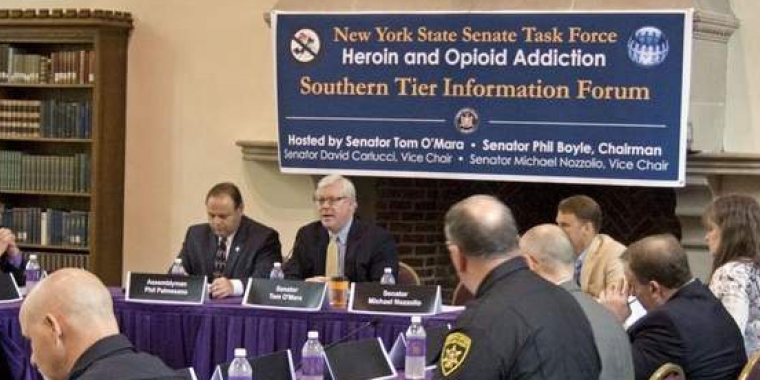
Anti-heroin awareness, training session set for September 24th in Corning

Corning, N.Y., September 18—State Senator Tom O’Mara (R,C-Big Flats), a member of the Senate Task Force on Heroin and Opioid Addiction, today reminded area educators, law enforcement agencies, medical and other professionals, and concerned community residents that the Center for Community Education and Training at Alfred State College will conduct an extensive, four-hour heroin awareness and training program in Corning on Wednesday, September 24, 2014.
The Corning training forum will be held at the Corning Radisson beginning at 8:00 a.m. The registration fee is $35 and includes a continental breakfast. Read more HERE.
According to the Center, “Opiate abuse and addiction are a growing problem in both rural and urban areas across the United States. This four-hour training provides the audience with a basic understanding of what opiates are and how they work in the human body. It will also provide information about the most effective forms of treatment for this disease. Specifically, we will discuss the three federally approved medications which can be helpful in treating this disease as part of a comprehensive treatment approach.”
The forum’s discussion topics will include:
> a description of how opiate misuse can create a physical dependence;
> what evidence says about the most effective forms of treatment;
> misunderstandings and myths about addiction and treatment; and
> resources available for those seeking treatment.
The forum will be conducted by the following panel of experts:
> Dr. Belinda Greenfield of the New York State Office of Alcoholism and Substance Abuse Services (OASAS), who oversees New York State’s opiate treatment programs. She is also active in national policy issues as part of her role as the State Opiate Treatment Authority (SOTA) for New York, and as the president of a national association representing all SOTAs throughout the country;
> Henry Bartlett, executive director of the Committee of Methadone Program Administrators of New York State (COMPA), a non-profit association representing opiate treatment programs statewide. Collectively, these programs treat more than 40,000 patients. He has worked in the addiction field for nearly four decades; and
> Dr. Susan Whitley, Director of Chemical Dependency for Kings County Medical Center. She is also a clinical assistant professor in the Departments of Psychiatry and Family Medicine at the State University of New York Downstate Medical Center in Brooklyn, and currently sits on the Clinical Advisory Panel for the state OASAS.
Additional details and information on the September 24th training forum can be obtained by contacting the Center for Community Education and Training at Alfred State by phone (607.587.4015) or by email (ccet@alfredstate.edu).
The Center has also scheduled another forum for Tuesday, September 23, 2014, at the Alfred State Lake Lodge.
“These upcoming Alfred State forums are timely and important to keep attention and awareness focused on the dangers of heroin throughout our communities,” said O’Mara. “I appreciate everyone, and every effort, on the front lines locally to help raise awareness and target the most effective responses to the heroin crisis.”
"Alfred State College is a solid leader in addiction counselor education and training, providing important and 'cutting edge' information to the local addiction workforce. Building on the work of the Senate Task Force on Heroin and Opioid Addiction, this is a wonderful opportunity to help educate our law enforcement, counselors, teachers, professionals and the general public on the heroin epidemic. We are committed to bringing experts to our communities to make this education accessible and hope people will take advantage of this important training," said Wendy Dresser Recktenwald, Senior Director of HR/CCET for Alfred State College.
The Legislature approved and, in late June, New York Governor Andrew Cuomo signed into law a comprehensive anti-heroin legislative package, which O’Mara co-sponsored in the Senate, focusing on a range of actions involving prevention, treatment and stricter criminal penalties.
This year’s new state laws largely reflect the work of the Senate Task Force on Heroin, which early this year issued a report and unveiled a set of legislative recommendations in response to the growing heroin crisis across the Southern Tier and Finger Lakes regions, and statewide. The legislative strategy followed a series of public hearings the task force held throughout the state beginning in early April, including one O’Mara sponsored at Elmira College. In all, the task force held 18 public forums, listened to 53 hours of testimony and heard from over 200 panelists.
O’Mara and his legislative colleagues solicited testimony from regional law enforcement officers and leaders, drug addiction counselors, treatment providers, educators, social services and mental health professionals, and other experts – as well as former addicts and current patients -- about the range of complex challenges posed by heroin including addiction prevention and treatment options, drug-related crimes, and other community and public safety impacts.
“It’s a first response. We’re going to keep working to determine the most effective combination of law enforcement, awareness and education, and treatment and prevention to try to stop the spread of heroin, better protect our communities and save lives,” said O’Mara.
According to figures from Cayuga Addiction Recovery Services, the numbers of 19-to-25 year olds in the Southern Tier and Finger Lakes treated for drug abuse increased more than 35 percent from 2007 to 2012.



